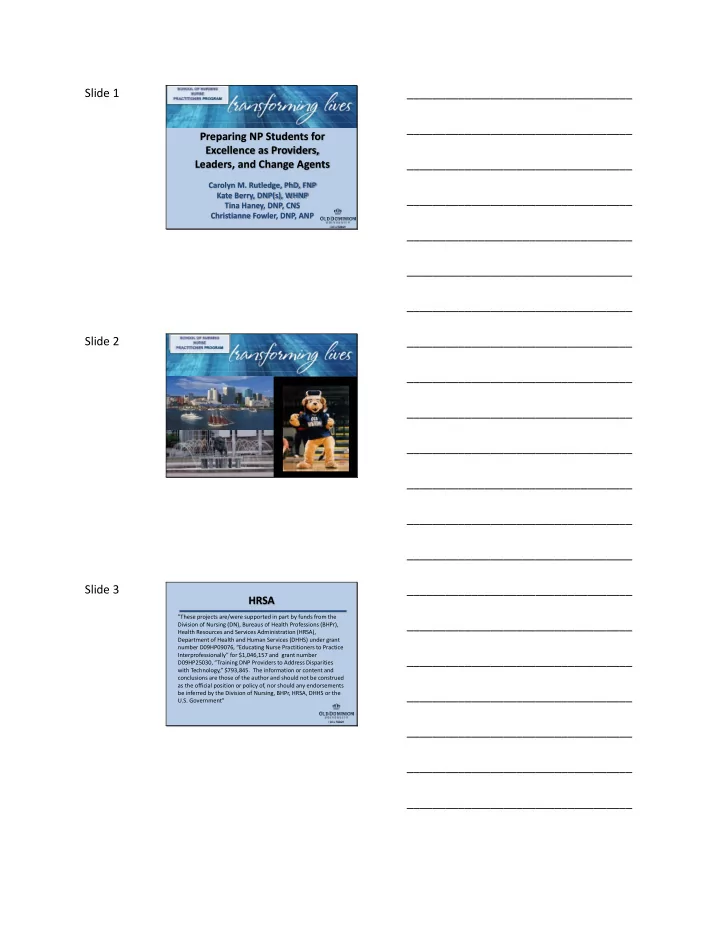

Slide 1 ___________________________________ ___________________________________ Preparing NP Students for Excellence as Providers, ___________________________________ Leaders, and Change Agents Carolyn M. Rutledge, PhD, FNP Kate Berry, DNP(s), WHNP ___________________________________ Tina Haney, DNP, CNS Christianne Fowler, DNP, ANP ___________________________________ ___________________________________ ___________________________________ Slide 2 ___________________________________ ___________________________________ ___________________________________ ___________________________________ ___________________________________ ___________________________________ ___________________________________ Slide 3 ___________________________________ HRSA "These projects are/were supported in part by funds from the ___________________________________ Division of Nursing (DN), Bureaus of Health Professions (BHPr), Health Resources and Services Administration (HRSA), Department of Health and Human Services (DHHS) under grant number D09HP09076, “Educating Nurse Practitioners to Practice Interprofessionally” for $1,046,157 and grant number ___________________________________ D09HP25030, “Training DNP Providers to Address Disparities with Technology,” $793,845. The information or content and conclusions are those of the author and should not be construed as the official position or policy of, nor should any endorsements be inferred by the Division of Nursing, BHPr, HRSA, DHHS or the ___________________________________ U.S. Government" ___________________________________ ___________________________________ ___________________________________
Slide 4 ___________________________________ Objectives • Providing NP Faculty with the knowledge and skills to ___________________________________ prepare NP students for Excellence as Providers, Leaders, and Change Agents • Specific focus on addressing: ___________________________________ • The Imposter Syndrome • Personal Strategic Plans • Leadership ___________________________________ ___________________________________ ___________________________________ ___________________________________ Slide 5 ___________________________________ Background • Healthcare is in crisis ___________________________________ • Nursing has an opportunity to make a difference. • The Future of Nursing: Leading Change, Advancing Health ___________________________________ • Interprofessional Collaborations • Time to focus on empowering NPs so they can maximize their impact and contributions as: • Providers ___________________________________ • Leaders • Change Agents ___________________________________ ___________________________________ ___________________________________ Slide 6 ___________________________________ Workshops 3 workshops ___________________________________ • Goal: To produce NP providers, leaders, and change agents equipped to create new interprofessional models of care ___________________________________ • Workshop 1: Imposter Syndrome • Workshop 2: Strategic Planning • Workshop 3: Leadership ___________________________________ ___________________________________ ___________________________________ ___________________________________
Slide 7 ___________________________________ ___________________________________ The Imposter Syndrome: Unlocking the Fear of Being ___________________________________ Successful and Serving as a Leader Kate Berry, WHNP, DNPs ___________________________________ Tina Haney, DNP, CNS ___________________________________ ___________________________________ ___________________________________ Slide 8 ___________________________________ The Process • Introduction to Imposter Syndrome • Curricular content: immersion, didactic, ___________________________________ discussion • Experiential workshop & peer support • Strategies to address phenomenon ___________________________________ • Mentor students to unlock fullest potential ___________________________________ ___________________________________ ___________________________________ ___________________________________ Slide 9 ___________________________________ Workshop: Imposter Syndrome • Coined by Clance and Imes in 1978 to designate an “ internal experience of intellectual phoniness ” ___________________________________ • Imposter syndrome can be defined as a collection of feelings of inadequacy that persist despite evident success ___________________________________ • ' Imposters ' suffer from chronic self-doubt and a sense of intellectual fraudulence that override any feelings of success ___________________________________ or external proof of their competence ___________________________________ ___________________________________ ___________________________________
Slide 10 ___________________________________ Workshop: Imposter Syndrome • Students complete the Clance Imposter Syndrome ___________________________________ Self-Evaluation • A didactic presentation on the Imposter Syndrome • Small work-groups to develop strategies ___________________________________ • Sharing their strategies • Pairing for ongoing support ___________________________________ ___________________________________ ___________________________________ ___________________________________ Clance Imposter Slide 11 ___________________________________ Phenomenon Scale (CIPS) • Students complete the ___________________________________ 20 item “Clance IP Scale” • female n=15; male n=1 (n=16) • < 40= Few Imposter characteristics (0 %) ___________________________________ • 41-60= Moderate Imposter experiences (0 %) • 61-80= Frequent Imposter Feelings (0 %) • >80= Intense Imposter ___________________________________ experiences (100%) ___________________________________ ___________________________________ ___________________________________ Slide 12 ___________________________________ Didactic: Imposter Syndrome ___________________________________ Dunning-Kruger effect How good (illusory superiority) you think you are ___________________________________ Imposter Syndrome How good you are ___________________________________ ___________________________________ ___________________________________ ___________________________________
Slide 13 ___________________________________ Workshop: Intellectual Imposters • Are unable to internalize their accomplishments • Feel fraudulent ___________________________________ • Feel they do not deserve their success Dismiss success as luck or other’s bad judgment • Expect to be found out ___________________________________ • Often individuals from various professions that suffer from Imposter Syndrome may: • Take over • Remain quiet ___________________________________ • Disengage or refuse to participate ___________________________________ ___________________________________ ___________________________________ Slide 14 ___________________________________ Individuals at Risk for Imposter Syndrome ___________________________________ • Nurse Executives and Nurse Leaders • Students in competitive graduate and doctorate programs • Young professionals and business owners ___________________________________ • Persons for whom success came quickly • Various demographic factors: gender, race, age, class, & culture ___________________________________ ___________________________________ ___________________________________ ___________________________________ Slide 15 ___________________________________ Symptoms of the Imposter Syndrome ___________________________________ • Self-doubt • Sense of incompetence • Generalized anxiety • Fear ___________________________________ • Immobility • Persistent stress ___________________________________ ___________________________________ ___________________________________ ___________________________________
Recommend
More recommend